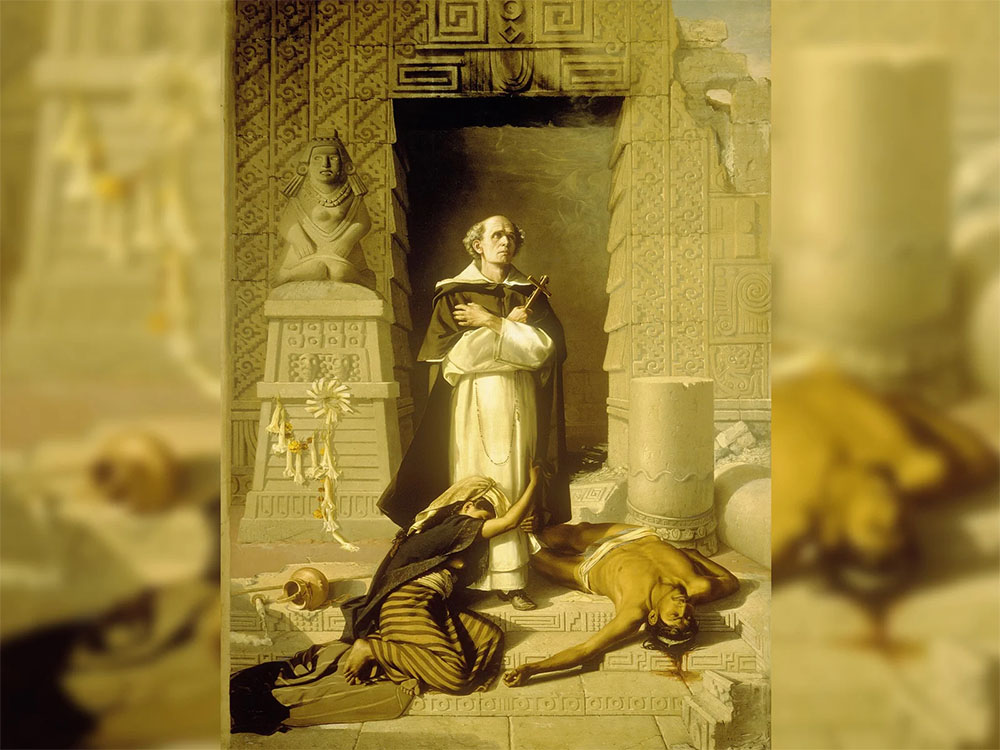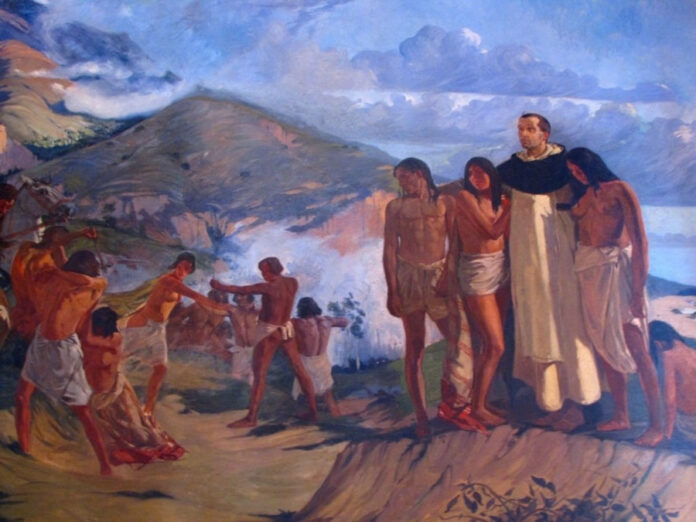Bartolomé de las Casas is considered a precursor of human rights for being one of the first defenders of indigenous people
Shared from/by México Desconocido
Fray Bartolomé de las Casas was born in Seville in 1484, into a Spanish family close to Christopher Columbus and the project of conquest.
In 1493 Bartholomew’s uncle, Juan de la Peña, returned from an expedition with Columbus. The entrance of the colonizers consisted of a parade where birds and seven slaves from the New World were exhibited. This image marked the Sevillian.
At the age of 15, Bartolomé received his father, Pedro de las Casas, who was returning from Columbus’s third expedition. On this occasion the loot consisted of 600 indigenous people brought as slaves.
As a gift, Pedro de las Casas placed a slave brought from the Indies at the service of Bartolomé. Bartholomew took advantage of the slave as an object of study, undertaking research into comparative religions and philology.
In 1500 Isabel la Católica penalized the possession of Indian slaves with death, demanding that Columbus stop mistreating the crown’s Indian subjects. As a consequence, young Bartholomew’s slave was freed and returned to his place of origin.
The legislation was not well received by Columbus, who considered that the indigenous people could be enslaved for being pagans. The queen then promoted evangelization for the Indians in her own lands.
Until her death, and even in her will, Elizabeth I requested that the indigenous people be treated with dignity.
First trip of Brother Bartolomé de las Casas to the Indies
After completing his religious studies, Bartholomew embarked on an expedition to the Caribbean in 1502. Some consider that the trip was due to his religious vocation, others attribute it to the desire to protect overseas businesses.

In the Indies, a new conversion system was formed, the encomiendas, which placed the indigenous people under the protection of the Spanish. However, encomiendas began to be forms of simulated enslavement.
Among the lighter tasks of the Indians was hunting, however mining was a priority for the Spanish. As a consequence, many indigenous people began to die, mainly in the gold mines.
Upon his arrival in Hispaniola (Haiti and the Dominican Republic), Bartholomew placed himself under the orders of Nicolás Ovando, who was in dispute with Columbus. During his stay he witnessed the murder of indigenous leaders, in addition to participating in the armed struggle against the native population. As payment for his services, Bartolomé de las Casas received his own commission.
In 1506 Bartholomew returned to Seville and was ordained a priest, later being ordained a priest in the city of Rome.
Second trip to the Indies
In 1508, Brother Bartholomew traveled again to Hispaniola. On this occasion the island was under the government of Diego Colón, son of Christopher Columbus, who once again gave it a commission. During his stay he received the first Dominican friars, who began a movement in favor of the rights of the indigenous people.
On Dec. 21, near Christmas, the Dominican order denounced the cruelty of the Spanish in the text known as “Advent Sermon.” The text describes the covert oppression of the encomiendas.
In the same way as Christopher, Diego Columbus made a conservative protest, which caused the radicalization of the Dominicans. After several debates in Spain, the Laws of the Indies emerged, the first human rights work in history. Despite his closeness to the Dominicans, Bartolomé retains his entrustments.
In 1514 Bartholomew went to Cuba. He was appointed chaplain and received a large encomienda, which he exploited in the extraction of gold.
During this stage of the conquest, Bartholomew developed a polarized reputation. By some indigenous people he was considered a peacemaker and pious preacher, by others an ambitious murderer. The feelings towards his person and the contemplation of suffering began to become more and more relevant for Bartholomew.
The situation generated a process of reflection in the clergyman, who that same year resigned from his charge.
Fray Bartolomé de las Casas and the humanist perspective
In 1515 Bartolomé de las Casas wrote a new denunciation against the conquistadors and traveled to Spain to deliver it. During his stay he promoted a plan of peaceful Christianization.
As a result of his activism, Bartolomé received the title of “Protector of Indians” by Cardinal Jiménez de Cisneros.
Due to the compassion that Bartholomew felt for the massive deaths of indigenous people in the mines, he proposed the importation of slaves from Africa. Some time later he also reconsidered and declared that black people deserved the same freedoms as indigenous people.
Upon his return to Hispaniola, Bartolomé de las Casas was poorly received by the conquerors. The Spanish were not willing to give rights to the indigenous people. Selfishness and greed opposed Father Bartholomew’s philanthropic vocation.
In that year the crown sent three monks to establish a provisional government on the island, the monks immediately took sides with the colonizers. In addition to the government, the monks were tasked with psychologically analyzing the natives, concluding that the indigenous people possessed animal intelligence. With this, racism and dehumanization for economic reasons continued their path.
Bartolomé de las Casas and the defense of indigenous dignity
To combat the idea of indigenous irrationality, Bartolomé undertook an experiment on the Venezuelan coast. The project consisted of peaceful preaching with the help of religious and peasants. However, a previous war between conquerors and indigenous people made the mission fail.
Disappointed, Bartholomew took the Dominican habit and retired to a convent in 1523. For six years he dedicated himself exclusively to the study of the humanities, also exploiting his anthropological genius.
In 1529 Friar Bartolomé left his retirement and began a second period of preaching. Fray Bartolomé’s success came in 1536, when he managed to peacefully convert a community in Central America.
The complaint against the Spanish
After his triumph as a preacher, Bartolomé made a new trip to Spain, which resulted in the promulgation of the New Laws, legislation that prohibited indigenous slavery.
In 1542 Las Casas finished writing his best-known work, the Brief Account of the Destruction of the Indies. The text is a detailed description of the exploitation and abuses exercised by the Spanish.
Soon Brother Bartolomé gained a great reputation, which is why he was offered the bishopric of Peru, which he rejected. In 1544 he was ordained bishop of Chiapas, which allowed him to maintain closeness with the Central American missions.
During his stay in Mexico, De las Casas became an eyewitness of Cortés’ conquest process. During the period from 1546 to 1547 he became involved in disputes with different authorities of the viceroyalty, some in favor of the rights of the indigenous people and others who sought to repeal the New Laws. In addition, he fought human trafficking in Mexico and the old continent.
The last transcendent action of Brother Bartolomé in Mexico was the defense of his thesis on the dignity and capacity of the indigenous people, which triumphed in Mexico City.
A current voice
Due to the hostility that De las Casas encountered in New Spain, he decided to continue his work close to the crown. Until his death in 1566, he dedicated himself to denouncing the violence of the Spanish in the conquest. His publications, often misunderstood, are not a manifesto against the Spanish, they are a demand for tolerance and respect towards all individuals. The Brief Account of the Destruction of the Indies is for many the embodied voice of the rage, pain and tragedy of the conquest.
Without a doubt, the work of the “Apostle of the Indians” is still valid, in an era where new systems of simulated exploitation threaten human dignity.
“The reason why Christians have died and destroyed so many and such an infinite number of souls has been solely because their ultimate goal was gold and filling themselves with riches in very short days and rising to very high states […] because of insatiable greed and ambition that they have had, which has been greater than in the world could be, because those lands are so happy and so rich, and the people so humble, so patient and so easy to subject them.
Fray Bartolomé de las Casas, Very brief account of the destruction of the Indies.
About his work, José Martí wrote in The Golden Age:
“You cannot see a lily without thinking of Father Las Casas because with kindness the color became lily-colored… He saw them burning, he saw them look with contempt from the bonfire at their executioners; and he never wore anything but the black doublet. But he went to console the Indians in the mountains, with no help other than his tree branch staff.



